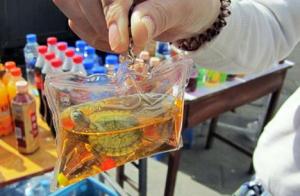
A disturbing and cruel trend is emerging in China; keyrings containing live animals. The keyrings may contain one of three options for the discerning customer: one newt, one Brazil turtle or two small kingfish. Each keyring contains ‘nutrient rich water’ in varying choices of colour and can be bought for as little as £1.00. Of course, the water is not nutrient rich (tested by veterinarians) and the animals are contained in a small space until they die a few days later due to suffocation. But with prices this cheap, does it really matter to the customer if they die quickly when they can purchase more of them cheaply, ever increasing the demand?
The keyrings are sold openly in public areas due to this trade being completely legal in China as they are not ‘wild animals.’ Members of the general public acquire these keyrings perhaps as a ‘cool novelty’ or as one unidentified customer said “I’ll hang it in my office, it looks nice and brings good luck.” Some well-wishers are unintentionally increasing demand as they are buying large quantities of keyrings and releasing the animals into the wild.
In addition to increasing demand, the released animals may cause additional problems to the ecosystem if animals are released in the wrong environments, resulting in competition for limited resources. Customers should also be aware of the health risks posed by the animals in the keyrings. For example, turtles are carriers of salmonella bacteria, which may be extremely harmful if individuals come in contact with it.
This obvious cruelty is becoming increasingly popular in China. Encouragingly, so is the global awareness of this trade, sparking campaigns to try and stop the sale of these keyrings immediately. If the general public of China use their better judgement, hopefully the demand will drop and the trend will decrease.
Check out Frontier’s science club for other environmental news!

